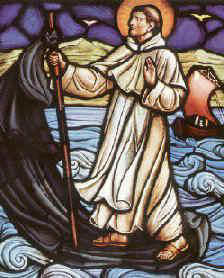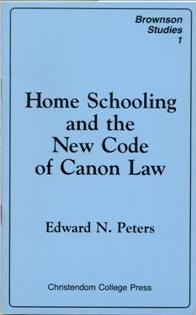|
To work for the proper implementation of canon law is to play an extraordinarily constructive role in continuing the redemptive mission of Christ. Pope John Paul II |
|
|
|
|
Resolution 1152 x 864 |
Updated 6 jan 2013 |
A Canon Lawyer Looks at Home Schooling |
|
Edward Peters, "A canon lawyer looks at home-schooling", Catholic Dossier (Mar-Apr 1997) 19-21.
More info here |
Nearly ten years ago I wrote a small
booklet entitled Home Schooling and the New Code of Canon Law (Christendom
Publications: Front Royal VA,
1988). The biographical note on the back cover stated that my wife Angela
and I then had one child. Well, today we have five children, and for our family these
last 10 years have seen home schooling go from a principle that should work in
theory to a reality that has proven effective time and time again. If you detect between those lines a faint sigh of relief, you're right. Where, I ask, are the home schooling
parents, having chosen a educational routine completely different from that
which was chosen for them by their parents (and their parents before them, and
theirs before them), where are they who have not nursed somewhere within their
hearts the nagging question that plagues and blesses every conscientious mother
and father: are we doing the right thing? Well, it seems, we were doing the
right thing, and it turned out to be the right thing for something like one
million other children in the United States last year. What most impresses me as a Catholic
parent and lawyer, however, is the level of ecclesiastical protection that the
parental choice to home school enjoys under the laws of the Catholic Church. Ten
years ago, while working on the home schooling booklet, I read the Code's
provisions on education as would a student, being struck primarily by the ways
in which the canonical norms repeatedly reinforced and supported the rights of
parents to make the fundamental decisions about their children's education. This
orchestration I attributed to intelligent draftsmanship. Good ole canon lawyers. Now, however, I read the same canonical
provisions, provisions that I have applied in my own life and which I have
assisted others in applying in theirs, and I see not simply intelligent
drafting, but, may I say frankly, Dei digitum. Good ole Holy Spirit. Canon lawyers know that the 14 principal
provisions of the 1983
Code concerning education (see Canons 793-806) were, for the most part, settled upon by the middle 1970s,
that is, at a time when home schooling was hardly being discussed in
Catholic circles, at least, not much beyond some Catholic charismatic
communities with ties to Evangelical Protestants. But the Holy Spirit was already
seeing to it that the 1983 Code would be, as Pope John Paul II put it, "a
great effort to translate conciliar teaching into canonical language." The
rich affirmations the Second Vatican Council gave to the primacy of parents in
matters of their children's education (located chiefly in the Council's
Declaration on Christian Education, Gravissimum educationis, did make it into both the letter and the spirit of
the revised Code
of Canon Law.
How else do we explain, for example the quite deliberate decision by the
revision committee working on this section of the Code to open the Church's own
canons on education with the word "Parents" (Canon
793)?
And deciding
in the same breath to change the title of the entire section from
"Schools", which it was under the 1917 Code, to less restrictive and indeed much more fundamental "Catholic Education"?
Lest anyone be tempted to write off these semantic changes as mere Roman word
games, one has simply to read the whole of Canon
793, especially the phrase that declares the right of
Catholic parents "to select those means and institutions through which they
can provide more suitably for the Catholic education of their children..."
Such unambiguous language is, I suggest, the Holy Spirit's way of answering a
question that had not even been posed yet: How far will the Church go in
recognizing the right of Catholic parents to choose the options which they feel
will best serve their children's education? Apparently, quite far.
Leave it to canon law, moreover, to anticipate and avoid the conceptual errors
that such clear thinkers as Mary Ann Glendon and Janet Smith, to name but two,
have recently pointed out in the secular arena. These errors boil down to the
excessive reliance on "rights language" in modern discourse. For,
having enunciated the natural and ecclesiastical right of parents over the
choice of means and institutes for their children's education, the Code
immediately grounds that right in the vocational duties of parents and spouses.
"Because they have given life to their children, parents have a most
serious obligation and enjoy the right to educate them; therefore Christian
parents are especially to care for the Christian education of the children
according to the teaching handed on by the Church." (Canon
226
§ 2). In
directly discussing the effects of marriage, Canon 1136 states, "Parents have the most serious duty and the
primary right to do all in their power to see to the physical, social, cultural,
moral and religious upbringing of the children."
Ten years ago, I knew of no American bishop who had taken a position on home
schooling. Today, several have. These responses range from benign indifference
up to and including positive endorsement and praise. I predict that as the
graduates of the home schooling movement advance successfully through life (many
of the first home schooled students are now in graduate school or are beginning
careers), we will see more emphatic ecclesiastical support for parents choosing
to educate their own children.
Of course, there have been, for lack of better word, ecclesiastical skirmishes
along the way, not so much with bishops, but with some of their educational
establishments. As a member of a diocesan staff, I can well see how bureaucratic
unfamiliarity with a massive grassroots movement leads at times to official
hesitancy and occasional opposition. This is normal.
It has been my impression as an advocate or advisor, though, that most of these
differences were resolved upon a measured explanation of these points: (1) the
Church's rich tradition on parental rights and duties in educational matters; (2)
the high
compliance of home schooling material and content with approved Church teaching;
(3) the
obvious success of home schooling in almost every virtually context in which it has been
tried; and (4) the willingness of parents to make full use of the Church's own
procedures for the resolution of disputes. These procedures, of course, are not
exhausted at the arch/diocesan level, but few cases I'm familiar with ever got
that far. They didn't have to.
A decade ago, not one person in a hundred had heard of the information
superhighway. Today, not only is the Internet an active presence in millions of
American homes, but we have witnessed a simultaneous explosion in the number and
quality of self-guided computer learning systems, all sorts of multimedia
educational broadcast avenues, creative learning board games, and so on. The end
of all of this is nowhere in sight, and yet each step taken down the path makes
only more feasible the basic goals of home-based education. All the more
prophetically, it seems, does Canon 793 speak of parental freedom of choice over educational means
as well
as institutions.
At the same time and despite the massive reductions in numbers of Catholic
schools and their enrollments since
Vatican II and despite the artificially high cost of Catholic education (I say artificially
high mostly because of the
steadfast refusal of civil government to ease the tax burden on parents using
religious and private schools, despite their consistently better results), canon
law still encourages, (well, sort of) bishops to open new schools (see Canon 802).
This occurs so rarely, however,
that it's a news event when it does happen. In
any case, probably at least for the next generation, most parents will still
choose a school-based education for their children. Other parents might entrust
some of their children to a formal school while educating others at home, and
some parents will enter into cooperative programs with structured schools for
certain subjects. Within this general situation of most parents utilizing, to
some extent, a traditional school, canon law also encourages Catholic parents to
make use of Catholic schools. Even here, however, the Code immediately stresses
that what is of prior importance is the parental pursuit of a Catholic education
for their children, by whatever means available (Canon
798). When
he promulgated the Code
of Canon
Law in 1983, Pope
John Paul II wrote that "the Code is in no way intended as a substitute for
faith, grace, and charisms ... in the life of the Church. On the contrary, the
purpose of the Code is to create such an order in the Church which ... renders
their entire development easier, both for the ecclesial society and for the individual
persons who belong to it." (Pope John Paul
II, Apostolic Constitution Sacrae disciplinae
leges). Catholic
parents are specifically graced by Christ to exercise the charism of teaching
their children in accord with the magisterium of the Church.
|





